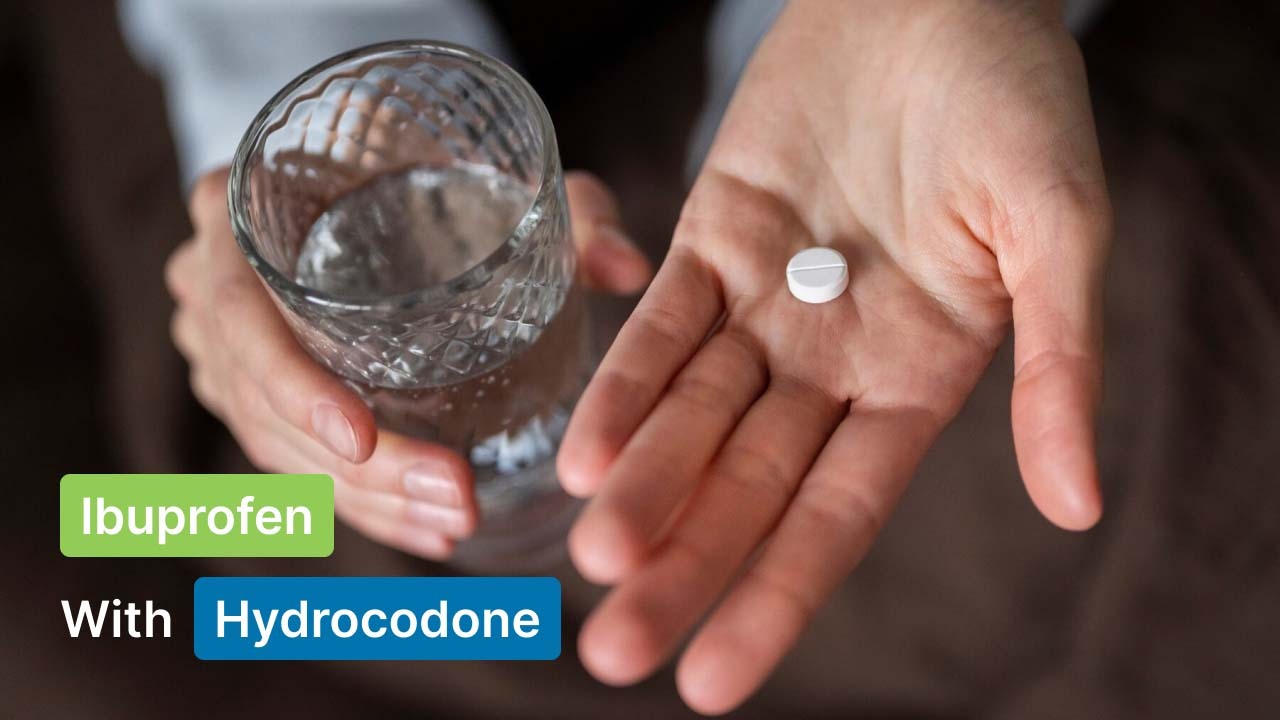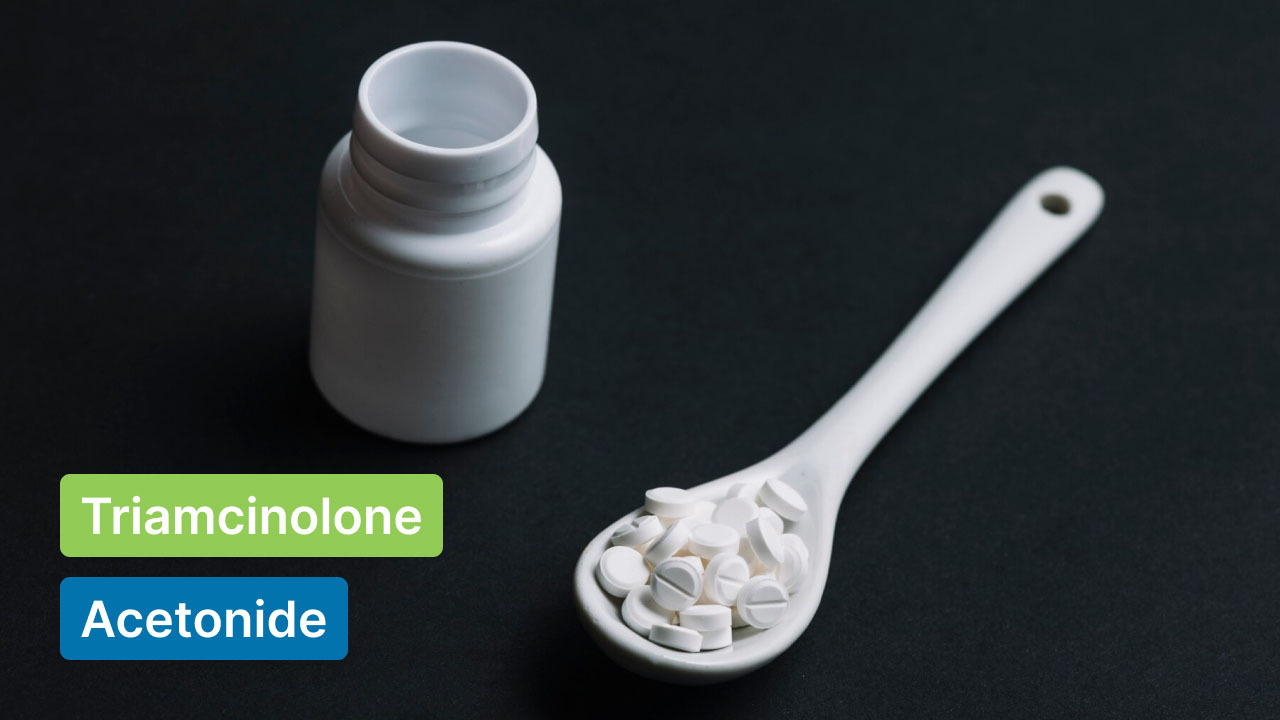
When it comes to managing pain, many find themselves searching for the best Over-the-counter pain relievers. Among such painkillers are Ibuprofen (Advil) and Hydrocodone (Norco), each with unique pain-relieving qualities.
However, one common question that confuses many people is, “Can you take ibuprofen with Hydrocodone?” “Is it safe to take them together?”
Hydrocodone is basically an opioid-based pain medication (narcotics), while ibuprofen is a non-steroidal anti-inflammatory drug (NSAID).
Both perform well as painkillers are used for short-term purposes. But can they really be taken together? Fortunately, yes. You can take Ibuprofen and Hydrocodone together.
In fact, there's a prescription medication named Vicoprofen, which consists of both drugs. But here's the thing. You can't take them together unless it's prescribed by a trusted doctor to address the condition you're being treated.
In this blog, we'll take a look at the complications of these pain drugs and explore potential interactions and side effects to help you decide and address the question: Can you take ibuprofen with hydrocodone? Let’s get started with the basic overview.
Ibuprofen and Hydrocodone: Overview
Hydrocodone and ibuprofen can be a very effective combination when it comes to pain treatment. Before we go into their interaction, it's important to understand their basic roles associated with pain management.
Ibuprofen is a non-steroidal anti-inflammatory drug commonly used to alleviate pain, reduce inflammation, and lower fever.
It works by inhibiting the production of certain chemicals, such as prostaglandins, in your body that contribute to pain. With fewer prostaglandins in your body, you will experience less pain and inflammation, as well as a decreased fever.
Hydrocodone, on the other hand, is an opioid pain medication that alters the way your brain and Central nervous system (CNS) respond to pain.
It does so by blocking the pain signals from traveling the brain and spinal cord. It is often combined with other non-opioid pain relievers to boost its effectiveness.
Both of these medications target pain differently, and their combination can provide enhanced short-term pain relief.
This combination of medicine works wonders during the early signs of severe pain. Patients who encounter chronic pain due to surgeries, cancer, accidents, or other injuries are prescribed opioid drugs.
In cases where these alternate painkillers are ineffective, Ibuprofen/hydrocodone tablets are recommended. Clinically, they are also used to reduce the risk of alcohol and drug addictions.
The combination of Ibuprofen and Hydrocodone medication is sold under three different brands in the United States, namely:
- Ibudone®
- Repraxin®
- Vicoprofen®
Now, let’s come to the main part of the blog to address your question.
Can You Take Ibuprofen with Hydrocodone?
The answer is yes or no. The combination of ibuprofen and hydrocodone is not uncommon. They have proven to work as effective painkillers in many chronic patients.
However, taking this medication is usually unnecessary when experiencing mild pain. In such cases, one drug alone is enough to ease pain.
Usually, ibuprofen is preferred over hydrocodone, considering the potential risks associated with opioid use. Let’s get an in-depth insight into the mechanism of action behind them.
Ibuprofen and Hydrocodone – Mode of action
Hydrocodone is a full opioid agonist that primarily targets the mu-opioid receptor, though it can interact with other opioid receptors as well at larger doses. As you may know, analgesia is the main medicinal effect of hydrocodone.
Hydrocodone, like all other full opioid agonists, has no analgesic ceiling effect. In clinical practices, the dosage is adjusted to achieve an appropriate level of analgesia and may be confined by side effects, such as breathing problems.
The exact mechanism underlying the analgesic action of this drug remains unknown. However, specialized CNS opioid receptors for endogenous substances with opioid-like activity have been found throughout the brain and spinal cord. These are believed to contribute to the analgesic effect of the drug.
On the other hand, Ibuprofen has analgesic, anti-inflammatory, and antipyretic properties. Its exact mode of action is unknown, too; however, it appears to involve the inhibition of cyclooxygenase (COX-1 and COX-2).
This is also the case for other non-steroid anti-inflammatory medications. These enzymes are responsible for the production of prostaglandins. By reducing prostaglandin levels, ibuprofen helps alleviate pain and inflammation.
The combination of these medicines is typically administered to treat acute pain that is severe enough to demand the use of an opioid since over-the-counter pain treatments are not tolerated.
What are The Side Effects and Risks of Taking Ibuprofen With Hydrocodone?
Both hydrocodone and ibuprofen are safe to be taken for short-term pain relief. But, they pose a few mild side effects, and their combination may increase the risk of certain adverse reactions.
Below are some of the common side effects you may experience while taking them simultaneously.
- Swelling of hands, legs, and arms
- Unusual weight gain
- Liver problems
- Kidney-related issues
- Nausea and vomiting
- Dizziness and drowsiness
- Heartburn
- Gas and diarrhea
- Indigestion
- Nervousness and anxiety
- Headache
- Suicidal thoughts (In case of overdose)
- Constipation
- Ringing in the ears
- Skin rash or blisters
- Flu-like symptoms
If you experience any of these symptoms, talk to your doctor right away. They will modify your dose or suggest alternative drugs accordingly.
Aside from these side effects, some people also have a few serious effects, which could be signs of an overdose. These include:
- Severe headache and drowsiness
- Blue lips or nails
- Slow or shallow breathing or shortness of breath
- Cold and sweaty hands
- Slow and irregular heartbeat
- Bleeding in the stomach or coughing up blood
- Hallucinating and distressed
- Bloody poops
- Allergic reactions
Serious breathing problems may be more common in older people (over 65 years old), as well as those who are frail, suffer from wasting syndrome, or have persistent respiratory diseases.
Regardless, if you notice any of these signs, stop taking these drugs and call your doctor to seek immediate medical help.
How to Take Hydrocodone with Ibuprofen?
Generally, healthcare providers provide personalized guidance based on your medical history and current health status.
You can take Hydrocodone and Ibuprofen exactly as directed on the product label or as prescribed by the doctor. Each tablet contains 200 mg of ibuprofen plus either 2.4, 5, 7.5, or 10mg of hydrocodone.
You must take it orally every 4-6 hours with a full glass of water. Avoid lying down for at least 10 minutes after taking this. Some doctors advise taking this medication with food for people who have issues with nausea or vomiting.
If you ever miss a dose, take the next one at your regular time. But never two doses at a time; there must be 4-6 hours gaps.
Never use them in larger quantities or for longer than prescribed. The manufacturer recommends taking no more than five tablets daily (24 hours).
Inform your doctor if you sense an increased desire to take more of this medication, as it could be a sign of addiction. Misuse of this combination medicine may cause addiction, overdose, or death.
Another thing to keep in mind is not to keep leftover opioid drugs. This is because just one dose may cause death if someone uses this medicine accidentally or improperly.
So, it's better to throw out the unused medicine. We shall discuss more precautions and safety concerns later in this blog.
What Medications Should Not be Mixed with Hydrocodone and Ibuprofen?
Drugs are nothing but made of chemicals. Certain medications may cause chemical reactions when mixed with other drugs, some of which could be harmful to your health.
That's why it is important to be aware of what not to mix when taking ibuprofen with hydrocodone.
- Anti-inflammatory painkillers such as aspirin, diclofenac, naproxen, ketoprofen, or mefenamic acid.
- High blood pressure medications
- Seizure medications
- COPD drugs
- Medication for Parkinson's disease
- Migraine drugs
These are only some of the drug interactions. Be sure to discuss this matter with your doctor, and be honest about what medications you are taking currently.
Precautions Before Taking Hydrocodone with Ibuprofen
Now that you are aware of possible side effects when taking hydrocodone with ibuprofen, there are a few precautions and safety concerns to keep in mind:
- Do not exceed the recommended dosage or take them for extended periods, as it can give rise to serious breathing problems and may cause death.
- Again, never take the medication on your own. Always take it as prescribed by your doctor.
- Do not drink alcohol. Deadly side effects may occur if you use this medicine with alcohol or with other OTC medication containing alcohol. This is because alcohol may boost the CNC depressant effects of hydrocodone.
- Do not drive, lift heavy equipment, or operate heavy machinery, as ibuprofen and hydrocodone tablets can make you drowsy, dizzy, or lightheaded. It could be dangerous if you encounter any accidents due to these effects.
- Do not take any other NSAIDs, including those offered in lower doses without a prescription, while taking hydrocodone and ibuprofen tablets. NSAIDs may be found in over-the-counter drugs that are used to treat colds, fever, and sleeplessness.
- Do not take these medicines right before or after a heart surgery such as coronary artery bypass graft (CABG). Also, avoid taking it if you have had a heart attack recently.
- Always store this pain medication in a safe place, out of reach of children. Misuse of this medication may bring lots of complications. Also, do not keep expired or leftover medications.
- Pregnant and breastfeeding women must avoid taking this medication as it may cause life-threatening withdrawal symptoms in the newly born child. Ask your doctor if you can take it during this time.
- Do not stop taking this medication without informing your doctor, even if you feel your pain has disappeared.
- Lastly, never take your health for granted. If you find it difficult to breathe or feel a heavy pain in your chest, head to your nearest medical clinic and seek emergency medical help.
Some people with conditions need to exercise caution when taking ibuprofen with hydrocodone. Do not take this combination drug if you:
- are an adult over 65 years of age
- have a history of seizures, head injury, or brain tumor
- suffering from severe asthma or breathing issues
- have issues with urinating
- have a blockage in your stomach or intestines.
- have high blood pressure
- liver, kidney, or thyroid problems
- dealing with mental health problems
- have alcohol or drug addictions
Alternatives to Ibuprofen and Hydrocodone
Apart from Ibuprofen and Hydrocodone medication, there are other options you can consider to ensure complete care without compromising your health. Some of the alternatives are:
- Non-steroid analgesics (Eg. Acetaminophen or Tylenol (The most common one)
- Other NSAIDs (Eg. naproxen, diclofenac)
- Physical therapy (Eg. Massage, acupuncture, heat and cold therapy)
- Prescription medications for muscle relaxants (Eg. Gabapentin, pregabalin)
- Doing meditation, exercises, and following healthy lifestyle changes
At the end of the day, it is always advised to consult a qualified healthcare practitioner before starting or modifying any medication routine. They may guide on proper dosage, potential interactions, and monitoring restrictions to ensure a safe plus effective pain management plan.
Final Thoughts
We hope you found your answer to “Can you take ibuprofen with Hydrocodone?” in this blog. The short answer is yes, but it's important to approach this combination with caution.
From the above insights, we can conclude that taking ibuprofen with hydrocodone is certainly safe but not advisable. It should always be taken with professional medical guidance.
While these medications can provide effective pain relief when used properly, the potential for side effects and risks call for careful consideration.
Always make your doctor aware of any other medications or supplements that you are taking to lower your risk of a potentially dangerous drug interaction.
Not just these two, but combining any medications can be quite tricky. Some medications should never be mixed, while others can be combined in certain doses. That's why it's always better to discuss with a qualified doctor before taking any medications.
FAQs
1. Can you take ibuprofen with painkillers?
Ans: Yes. It's totally safe to take ibuprofen with common painkillers like paracetamol, acetaminophen, or codeine. But you cannot take it with similar painkillers such as aspirin or naproxen before discussing it with your doctor.
2. Can acetaminophen be taken with ibuprofen?
Ans: Yes. You can take ibuprofen with acetaminophen for additional pain relief. Taking them together works wonders to relieve severe pain compared to if taken separately.
3. Do you stagger hydrocodone and ibuprofen?
Ans: Research shows that it's best to stagger the dosing of hydrocodone and ibuprofen. They can be taken every 6 hours.
4. What strength is hydrocodone ibuprofen?
Ans: Each hydrocodone and ibuprofen tablet contains 200 mg of ibuprofen and either 2.5 mg, 5 mg, 7.5 mg, or 10 mg of hydrocodone.
5. Does hydrocodone make you sleepy?
Ans: Yes. Similar to other painkillers, Hydrocodone can make you drowsy and sleepy. It may also disrupt the brain's normal sleep.
6. How long should I take Hydrocodone and ibuprofen?
Ans: Hydrocodone/ibuprofen medication is usually prescribed for short-term pain relief for a period of 10 days or less. It shouldn't be taken for more than 10 days as it could be habit-forming and potentially result in dependence.
Read Also









